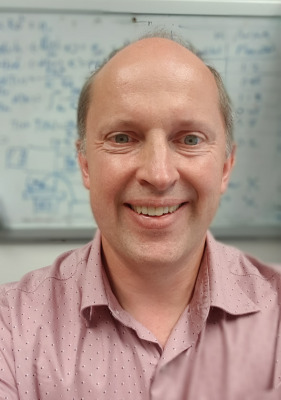Prof Oliver Fenwick
MA MSci PhD FHEA MIMMM MIOP
Director for Industrial Engagement
Professor of Electronic Materials
Engineering 312, Mile End
| Feedback/ support hours: |
Online, Thursdays 11am - 12 pm (call me on Teams) In person, Thursdays 1 - 2 pm (Engineering 3.12) |
| Expertise: |
Developing materials for electronic devices such as LEDs, transistors and thermoelectric generators. The materials include organic semiconductors, carbon materials and halide perovskites, as well as self-assembled monolayers for the control of interfaces in devices. I have a particular interest in thermal measurements, controlling nanoscale morphology and self-assembly to tune functional properties. |
| Research Centre: | Sustainable Engineering |
| Affiliations: |
Fellow of the HEA (FHEA) Member of the Institute of Physics (MIoP) Member of the IOM3 (MIMMM) |
Brief Biography
Prof Fenwick received his BA and MSci degrees in Experimental and Theoretical Physics from Jesus College, University of Cambridge in 2002. After graduation he worked as a Systems Engineer at BAE SYSTEMS until joining UCL for his PhD (2007). His early work focussed on near-field microscopy and lithography of conjugated polymers as well as developing a thermochemical nanolithography technique. His focus then shifted to the development of materials for organic electronic devices (OLEDs, transistors etc.) at UCL and then at the Institut de Science et d'Ingénierie Supramoléculaires (I.S.I.S.) at the University of Strasbourg. In this work he developed materials and optimised interfaces in devices to improve performance. This included studying charge transport materials in OLEDs and charge injection optimisation, with a focus on near-infrared OLED devices, and optically switchable OFETs.
Dr Fenwick started at Queen Mary in 2015 as a Royal Society University Research Fellow to study organic and perovskite materials for thermoelectric devices. Particular highlights of this recent work include the identification of high thermal conductivity states in conjugated polymers and the optimisation of tin-halide perovskites for thermoelectrics. Since 2019 he has also been working with Paragraf Ltd. on the integration of MOCVD-grown graphene into OLEDs and memristors. He served on the Management Team of the Centre for Doctoral Training in Plastic Electronic Materials (2018 - 2023) and Director for Industrial Engagement in the School of Engineering & Materials Science from 2020. He was Technical Lead on the Thermoelectric Energy Conversion Materials Roadmap for The Henry Royce Institute and the Institute of Physics (2020). In 2024 he was promoted to Professor of Electronic Materials.
Dr Fenwick started at Queen Mary in 2015 as a Royal Society University Research Fellow to study organic and perovskite materials for thermoelectric devices. Particular highlights of this recent work include the identification of high thermal conductivity states in conjugated polymers and the optimisation of tin-halide perovskites for thermoelectrics. Since 2019 he has also been working with Paragraf Ltd. on the integration of MOCVD-grown graphene into OLEDs and memristors. He served on the Management Team of the Centre for Doctoral Training in Plastic Electronic Materials (2018 - 2023) and Director for Industrial Engagement in the School of Engineering & Materials Science from 2020. He was Technical Lead on the Thermoelectric Energy Conversion Materials Roadmap for The Henry Royce Institute and the Institute of Physics (2020). In 2024 he was promoted to Professor of Electronic Materials.





